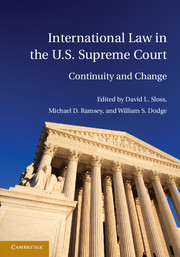Book contents
- Frontmatter
- Contents
- List of Contributors
- Table of Cases
- Acknowledgments
- Introduction
- PART I FROM THE FOUNDING TO THE CIVIL WAR
- PART II FROM THE CIVIL WAR TO THE TURN OF THE CENTURY
- PART III FROM THE TURN OF THE CENTURY TO WORLD WAR II
- PART IV FROM WORLD WAR II TO THE NEW MILLENNIUM
- PART V INTERNATIONAL LAW IN THE U.S. SUPREME COURT IN THE TWENTY-FIRST CENTURY
- V.A TREATIES AFTER 2000
- Main Essay – Medellin and Sanchez-Llamas: Treaties from John Jay to John Roberts
- Response Essay – The Benefits of Avoiding Conflicts between the Constitution and International Law
- Response Essay – Medellin and the Passive Vices
- V.B CUSTOMARY INTERNATIONAL LAW AFTER 2000
- V.C INTERNATIONAL LAW AND CONSTITUTIONAL INTERPRETATION AFTER 2000
- V.D INTERNATIONAL LAW AND STATUTORY INTERPRETATION AFTER 2000
- V.E INTERNATIONAL LAW AND THE WAR ON TERROR
- VI CONCLUSION
- Index
- References
Response Essay – The Benefits of Avoiding Conflicts between the Constitution and International Law
Published online by Cambridge University Press: 05 July 2011
- Frontmatter
- Contents
- List of Contributors
- Table of Cases
- Acknowledgments
- Introduction
- PART I FROM THE FOUNDING TO THE CIVIL WAR
- PART II FROM THE CIVIL WAR TO THE TURN OF THE CENTURY
- PART III FROM THE TURN OF THE CENTURY TO WORLD WAR II
- PART IV FROM WORLD WAR II TO THE NEW MILLENNIUM
- PART V INTERNATIONAL LAW IN THE U.S. SUPREME COURT IN THE TWENTY-FIRST CENTURY
- V.A TREATIES AFTER 2000
- Main Essay – Medellin and Sanchez-Llamas: Treaties from John Jay to John Roberts
- Response Essay – The Benefits of Avoiding Conflicts between the Constitution and International Law
- Response Essay – Medellin and the Passive Vices
- V.B CUSTOMARY INTERNATIONAL LAW AFTER 2000
- V.C INTERNATIONAL LAW AND CONSTITUTIONAL INTERPRETATION AFTER 2000
- V.D INTERNATIONAL LAW AND STATUTORY INTERPRETATION AFTER 2000
- V.E INTERNATIONAL LAW AND THE WAR ON TERROR
- VI CONCLUSION
- Index
- References
Summary
Professor Lori Damrosch's essay on the Supreme Court decisions in Medellin v. Texas and Sanchez-Llamas v. Oregon offers a careful and measured critique with a discouraging assessment of their future implications. In her view, the Medellin/Sanchez-Llamas opinions represent a “discontinuity” with the “Supreme Court's previous respectful treatment of international tribunals.” To make matters worse, the results in Medellin and Sanchez-Llamas create tension with historically accepted doctrines guaranteeing federal supremacy for treaty violations, presuming congressional intent to comply with international obligations, and providing judicial remedies for treaty violations. Thus, she strongly suggests that the Court is rejecting at least the spirit of past U.S. historical practice, if not the letter of U.S. law.
In this brief comment, I take issue with Professor Damrosch's critique of Medellin and Sanchez-Llamas. I maintain that her emphasis on doctrines favoring U.S. compliance with international law overlooks an equally strong tradition of U.S. adherence to constitutional norms over international ones. Seen in this broader historical context, the Court's decisions in Medellin and Sanchez-Llamas seem much less “discontinuous” than Professor Damrosch suggests. Because the decisions of the International Court of Justice (ICJ) in the Vienna Convention cases posed a serious and unprecedented constitutional challenge to the U.S. Supreme Court's authority and to the U.S. system of federalism, the Court's decisions fall within the long and honorable tradition of avoiding direct conflicts between constitutional requirements and international obligations.
- Type
- Chapter
- Information
- International Law in the U.S. Supreme Court , pp. 465 - 471Publisher: Cambridge University PressPrint publication year: 2011



